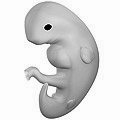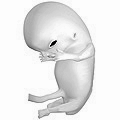Pregnancy is a state on women when she has a offspring or child into her uterus.Pregnancy takes a period of approximately 40 weeks(9 months) to finish and then a child is born.The term embryo is used to describe the developing offspring during the first eight weeks following conception, and the term foetus is used from about two months of development until birth.
Pregnancy occurs through a process of the fusion between a male and a female gamete.This process is generally referred to as "fertilization".This fusion of a male and a female gamete occurs through the act of sexual intercourse.
Offspring develops in about 9 months which are to be spent very carefully.These 9 months are considered to be very sensitive for women and also for the offspring because during these 9 months the embryo has to develop into a child.Variations in the development of offspring can create many abnormalities for the baby.Sometimes variations in the devlopment can lead the baby to death before birth.So remaining careful during pregnancy is important which includes eating healthy food, taking bed rest, avoid walking or exertion, no smoking, donot lift heavy weights etc.These all factors affects the devlopment of child.
The first time pregnancy for women is the most carefulness time because she is unexperienced about the pregnancy care.Thats why sometimes the child is miscarridged during first time pregnancy.First time pregnancy is hard for women, after that she become experienced.
Syptoms
There are some symptoms after pregnancy occurs which signs for pregnancy.These include:
the presence of human chorionic gonadotropin (hCG) in the blood and urine,
missed menstrual period,
implantation bleeding that occurs at implantation of the embryo in the uterus during the third or fourth week after last menstrual period,
increased body temperature for over two weeks after ovulation,
darkening of the cervix, vagina, and vulva,
softening of the vaginal portion of the cervix,
softening of the uterus and
darkening of the skin in a midline of the abdomen resulting from hormonal changes;
Diagnosis
The beginning of pregnancy may be detected in a number of ways, including various pregnancy tests which detect hormones generated by the newly-formed placenta. Clinical blood and urine tests can detect pregnancy soon after implantation, which is as early as 6-8 days after fertilization. Home pregnancy tests are personal urine tests, which normally cannot detect a pregnancy until at least 12-15 days after fertilization. Both clinical and home tests can only detect the state of pregnancy, and cannot detect its age.
Prenatal Development
Prenatal development is divided into two primary biological stages. The first is the embryonic stage, which lasts for about two months. At this point, the fetal stage begins. At the beginning of the foetal stage, the risk of miscarriage decreases sharply, all major structures including hands, feet, head, brain, and other organs are present, and they continue to grow and develop. When the fetal stage commences, a fetus is typically about 30 mm in length, and the heart can be seen beating; the fetus bends the head, and also makes general movements that involve the whole body. Brain stem activity has been detected as early as 54 days after conception,and the first measurable signs of EEG activity occur in the 12th week.Some fingerprint formation occurs from the beginning of the fetal stage.



















No comments:
Post a Comment